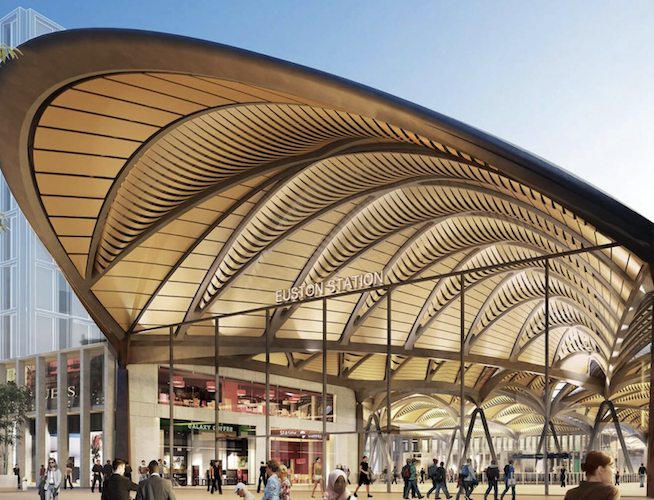The Green Party has high hopes of doing well in next year’s elections for London Mayor and the London Assembly, encouraged by picking up seats at last year’s borough elections and a solid European election result in the capital in May. But does their policy on one key issue affecting London quite add up? Notably for a party that foregrounds environmental issues, the Greens oppose High Speed 2 (HS2), the controversial proposed new rail link that would connect London, Birmingham and cities in the north of England. Why oppose what, on the face of it, ought to be a good project for the environment?
Kirsten de Keyser is the Green candidate for the Assembly constituency of Barnet & Camden, an area already affected by HS2 due to Euston station being lined up as its London terminus. She will also contest the Holborn & St Pancras parliamentary seat at the next general election. She is firmly behind her party’s policy of opposing HS2, explaining her belief that the environmental impact of constructing HS2 would outweigh its purported positive effects – an impact that would include not only the loss of natural habitats, but also the carbon emissions from construction. “If the means to an end are more destructive than the end is constructive, find a different solution,” she says.
For de Keyser, that solution means upgrading existing infrastructure rather than building new. Past experience suggests this might be costly, not least for rail users: the modernisation of the west coast mainline, completed in 2008, entailed a decade of disruption for commuters. Proponents of HS2 argue that all three main lines out of London would require extensive work to achieve the same expansion of capacity a single new high-speed line could achieve.
De Keyser recognises that the project has been wrongly sold on speed and that it is actually primarily about capacity. Her suggestion is introducing double-decker trains, which are common in continental Europe. These have never been used in Britain, largely because of the gauge widths and low tunnels of the country’s Victorian infrastructure. De Keyser’s response? “I don’t believe it can’t be done.”
This comment reflects more generally de Keyser’s opposition to HS2. It boils down to a lack of trust. She doesn’t believe the economic and environmental arguments put forward for the project are made in good faith. “You can’t put honest and HS2 in the same sentence,” she says. Her theory is that HS2 is a vehicle for developers to by-pass local opposition to development. Planning permission, she noted, is “devilishly difficult to obtain” in Camden, “but if you have the cover of a public project you can sweep aside the entire slate of planning permission”.
She believes it is no coincidence that the project has been put under review by the government just as land around Euston has been cleared. The area is now “absolutely primed for the next King’s Cross regeneration project,” she says. Her view is an expression of a more general opposition to development: “We don’t want to build any more in London.” De Keyser acknowledges that there is nothing in the public domain supporting this theory: “It is an incredibly controversial view and not a lot of people, if I may say so, are brave enough to express it”. If this sounds like a conspiracy theory, de Keyser would agree. She refers to it – part wryly, part affectionately – as “my conspiracy theory.”
Describing herself as having “always been on the left of politics”, she was a Labour Party member throughout its “modernisation” by Tony Blair, but left over Iraq and found a new home with the Liberal Democrats, attracted in particular to the party’s opposition to a rise in student tuition fees. But she had not signed up to deal-making with the Tories. Disillusioned with the coalition government, the final straw for her was the expansion of secret trials. Politically homeless once more, she turned to the Greens. She found they were not the single-issue party she had previously believed them to be and had “come of age”.
It is perhaps unsurprising that someone of De Keyser’s political background might lack trust in the good intentions of the government. But her stance also reflects her peculiar position as a Green parliamentary candidate in one of the safest Labour seats in the country. “I’m the one-person awkward squad,” she says. “Where you have these big safe seats it’s really important that you have an alternative voice, otherwise no debate is ever had.” As she sees it, in safe seats the incumbent party gets complacent: “Their own people don’t ask them the awkward questions.”
Thanks to Extinction Rebellion and Greta Thurnberg, environmental issues have been pushed to the foreground of political debate. This might help the Greens – oppositional, mistrustful of government and sceptical about development – to pick up voters and send a message to the Big Two parties. In the meantime, the battle over HS2 continues.
OnLondon.co.uk is dedicated to providing fair, thorough, anti-populist coverage of London’s politics, development and culture. It depends on donations from readers and would like to pay its freelance contributors better. Can you spare £5 a month? Follow this link to donate. Thank you.
